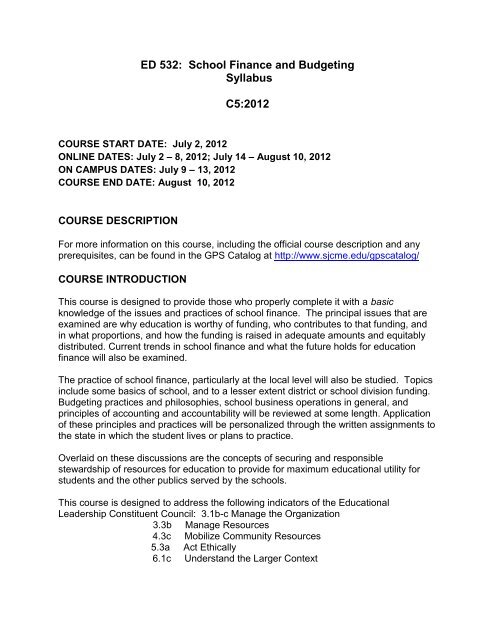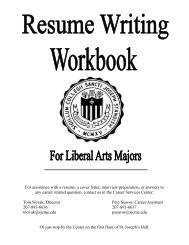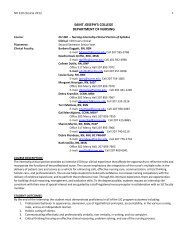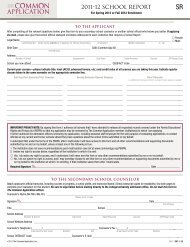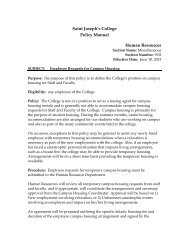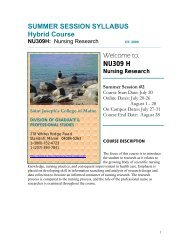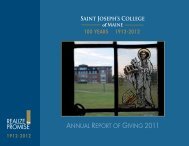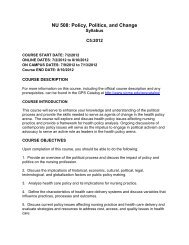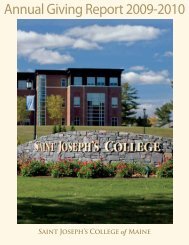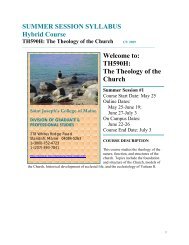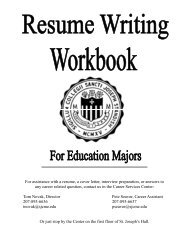ED 532 - Saint Joseph's College of Maine
ED 532 - Saint Joseph's College of Maine
ED 532 - Saint Joseph's College of Maine
You also want an ePaper? Increase the reach of your titles
YUMPU automatically turns print PDFs into web optimized ePapers that Google loves.
<strong>ED</strong> <strong>532</strong>: School Finance and BudgetingSyllabusC5:2012COURSE START DATE: July 2, 2012ONLINE DATES: July 2 – 8, 2012; July 14 – August 10, 2012ON CAMPUS DATES: July 9 – 13, 2012COURSE END DATE: August 10, 2012COURSE DESCRIPTIONFor more information on this course, including the <strong>of</strong>ficial course description and anyprerequisites, can be found in the GPS Catalog at http://www.sjcme.edu/gpscatalog/COURSE INTRODUCTIONThis course is designed to provide those who properly complete it with a basicknowledge <strong>of</strong> the issues and practices <strong>of</strong> school finance. The principal issues that areexamined are why education is worthy <strong>of</strong> funding, who contributes to that funding, andin what proportions, and how the funding is raised in adequate amounts and equitablydistributed. Current trends in school finance and what the future holds for educationfinance will also be examined.The practice <strong>of</strong> school finance, particularly at the local level will also be studied. Topicsinclude some basics <strong>of</strong> school, and to a lesser extent district or school division funding.Budgeting practices and philosophies, school business operations in general, andprinciples <strong>of</strong> accounting and accountability will be reviewed at some length. Application<strong>of</strong> these principles and practices will be personalized through the written assignments tothe state in which the student lives or plans to practice.Overlaid on these discussions are the concepts <strong>of</strong> securing and responsiblestewardship <strong>of</strong> resources for education to provide for maximum educational utility forstudents and the other publics served by the schools.This course is designed to address the following indicators <strong>of</strong> the EducationalLeadership Constituent Council: 3.1b-c Manage the Organization3.3b Manage Resources4.3c Mobilize Community Resources5.3a Act Ethically6.1c Understand the Larger Context
The Educational Leadership Council is a constituency group comprised <strong>of</strong> the AmericanAssociation <strong>of</strong> School Administrators, the Association for Supervision and CurriculumDevelopment, the National Association <strong>of</strong> Elementary School Principals and theNational Association <strong>of</strong> Secondary School Principals. The purpose <strong>of</strong> the council is toreview university-based educational administration programs that seek NCATE(National Council <strong>of</strong> for the Accreditation <strong>of</strong> Teacher Education) accreditation usingnational standards developed by the National Policy Board for EducationalAdministration.COURSE OBJECTIVESUpon completion <strong>of</strong> this course, you should be able to do the following:1. agencies (LEA's).2. Understand and be able to use and explain to lay people the technical languageused to discuss education finance issues.3. Analyze, interpret and present financial data, trends and issues to various publicsserved by the schools and outline possible actions and their implications.4. Develop an effective budget planning process that is driven by school and LEApriorities which meet state requirements and involves the staff and community.5. Understand and apply basic concepts and practices <strong>of</strong> budget administrationand accounting and reporting.COURSE FORMATThis is an accelerated five week online course with an additional week in the classroom,providing the opportunity to continue the online dialogue in a group setting. You willacquire the skills outlined in the course objectives through the following:Readings from the textbook and required readings, which may include casestudies.Lecture notesActive dialogue with your instructor and fellow learners via the coursebulletin boardActive dialogue and discussion in person with your instructor and classmates.Class Participation: You are expected to participate in the online dialogue atminimum three times per week per discussion question, preferably on nonconsecutivedays.
COURSE GUIDELINESThis is a graduate level course and I hope that students are excited to come to classand learn new ideas and share them with their fellow classmates. It is necessary forstudents to be present for every session and to participate in the discussions, andpresentations. In the unlikely event that absence or only partial attendance is possibleon a particular day students are asked to make arrangements with me as soon aspossible. Late assignments require similar communication and should be kept to aminimum. All <strong>of</strong> this discussion really assumes that class participants are pr<strong>of</strong>essionalsand will do pr<strong>of</strong>essional quality work and show pr<strong>of</strong>essional courtesies to each otherand to me. Few "rules" beyond that are requiredREQUIR<strong>ED</strong> TEXT(s)Brimley, Vern, Jr. and Garfield, Rulon R. 2011, Financing Education in a Climate <strong>of</strong>Change, 11th Ed., Allyn and Bacon, ISBN 0137071361Optional resources will be posted on your ANGEL course site.If you have any questions regarding your course materials, please contact youracademic advisor and/or our book vendor EdMap. You can reach EdMap byphone 1- (800)-274-9104 or website athttp://www.edmapbookstore.com/storefront/index/STJSPOPTIONAL MATERIALSAny short summary <strong>of</strong> accounting practices. Examples include:Dixon, Robert L, the McGraw-Hill 36 Hour Accounting Course 3rd Ed. (1993) McGraw-Hill ISBN 0070170980 (Note: A 4th Ed. will be published June 2007)Cooke, Robert A. The McGraw-Hill 36 Hour Course in Finance for Non-FinancialManagers McGraw-Hill (1992) ISBN: 0070125392Ittelson, Thomas R. Financial Statements: A Step-By-Step Guide to Understanding andCreating Financial Reports Franklin Lakes, NJ: Career Press (1998) ISBN:1564143414Siciliano, Gene, Finance for Non-Financial Managers (Briefcase Books Series)Columbus, OH: McGraw-Hill (2003) ISBN: 0071413774Each student will also be required to obtain school finance materials and documentspertaining to their state <strong>of</strong> preference. Please bring these with you to the on-campussession. These can usually be borrowed from the local school district or obtained fromthe state department <strong>of</strong> education. These include:
District annual financial reportsDistrict budgetsState School Finance Handbook or Statute BooksThe state school boards association in most states will have summary materialsthat may assist in meeting this requirement.REQUIR<strong>ED</strong> INTERNET SITES & INTERNET RESOURCESThe following sites will useful in obtaining supplementary information for the course.http://www.nces.ed.gov – National Center for Educational Statistics WebsiteThis is a good source <strong>of</strong> comparative financial information from throughout theUnited States. It also contains Handbook II Revision 2 <strong>of</strong> School Accounting forLocal and State School Districts.http://asbointl.org/index.asp - Association <strong>of</strong> School Business OfficialsInternational, the preferred organization <strong>of</strong> school business <strong>of</strong>ficers. Containsresources and is a source <strong>of</strong> publications.http://www.maine.gov/education/data/schfindata.htm -- This is the school financedata page for <strong>Maine</strong> public schools. It includes links to their finance handbook anddata about finance in <strong>Maine</strong>. Nearly every state has a similar page and can beaccessed through the main state government web page.www.law.cornell.edu/ – Legal Information Institute <strong>of</strong> the Cornell University LawSchool. Contains access to state constitutions, statutes and Supreme Courtdecisions, as well as similar federal court information.http://www.findlaw.com-- Legal information from national data bases.http://www.tea.state.tx.us/school finance/audit/gasb34_examples.htm – This is apage on the Texas Education Agency website that contains some examples <strong>of</strong>school district annual reports.www.nces.ed.gov/pubs2004/h2r2 -- This is the main link to Handbook II Revision2. It is highly recommended that you read this handbook for a clear understanding<strong>of</strong> common budgeting and accounting procedure nationwide..www.gfoa.org/downloads/schooldistrictguidelines.pdf -- This is the GovernmentFinance Officers Association link to evaluation <strong>of</strong> annual financial reports. Theentire website has a treasure trove <strong>of</strong> governmental finance, news and information
WRITTEN ASSIGNMENTSIn general the written assignments are to be submitted as papers or presentations, althoughalternative formats will be considered. Papers based on research are to be written in thesame style as would be submitted to any graduate course with any accepted format (e.g.APA). Other papers and presentation (e.g. PowerPoint) may be written as if they are beingpresented as background and recommendations to an administrative team or schoolgoverning board.Week 1:Do one <strong>of</strong> the following:1. Obtain and review the annual financial reports <strong>of</strong> a school district for the past fiveyears, and write a paper analyzing changes in the operating fund over the period andthe possible explanations for any changes. Be sure to consider both the sources <strong>of</strong>revenues and the objects <strong>of</strong> expenditures. Comment on any equity or adequacy issuesyou may discover.2. Obtain the documents that outline your state's school finance plan. Write a paperthat details the methods your state uses to ensure adequacy and equity. Comment onhow well it accomplishes those goals. Use local data to support your findings.3. Write an extensive review <strong>of</strong> the Jonathan Kozol's Savage Inequalities: Children inAmerica's Schools (Reprint Ed.) New York: Perennial Publishers, 1992 ISBN:0060974990. Develop and present a solution to the inequities in school financepresented in the book and discuss how this book will influence your philosophy <strong>of</strong>administration.Week 2 (On campus)Do one <strong>of</strong> the following:1. Select a state and give a short presentation <strong>of</strong> the main features <strong>of</strong> its schoolfinancing plan. Note: If you plan to do this option, let me know which state you preferprior to coming to campus so I can assign various states. (Only 2 persons will beallowed to present on <strong>Maine</strong>.)2. Research and give a presentation on the history <strong>of</strong> one <strong>of</strong> the federal programs.Include the basis <strong>of</strong> its institution and the history <strong>of</strong> its federal funding. Note: If you planto do this option, let me know which program you prefer prior to coming to campus so Ican assign them.Each <strong>of</strong> the above presentations should be informal and take no more than 10 minutesplus questions from the class.
Week 3Do any two <strong>of</strong> the following:1. Evaluate a school district's CAFR by using the self-evaluation tool found on theASBO website.2. Assume that the teachers <strong>of</strong> an elementary school are responsible for collectingmoney from students for their class accounts and for lunch tickets. Develop theprocedures for handling this money from the point <strong>of</strong> collection to the transmission tothe district's business <strong>of</strong>fice.3. Obtain a school district's audit report and write your response to the managementletter as if you were the financial administrator <strong>of</strong> the district.Week 4Do one <strong>of</strong> the following:1. Review the organizational chart <strong>of</strong> the business operations <strong>of</strong> a school district anddiscuss how the chart could be redesigned for improved service.2. Develop a schematic <strong>of</strong> a complete district purchasing process.Week 5Review a collective bargaining agreement and describe the clauses in it that are <strong>of</strong>benefit to the school district and the clauses that are not <strong>of</strong> benefit. Discuss how youwould negotiate changes in at least two <strong>of</strong> the clauses. Be sure to indicate what youwould “trade” with the employees to reach your objective.Week 6Submit the final project.
CLASS SCH<strong>ED</strong>ULEWeek 1 - OnlineTopic: The context <strong>of</strong> education finance. Equity and AdequacyRequired Readings: Read Brimley Chapters 1-3Assignments:Do one <strong>of</strong> the following:1. Obtain and review the annual financial reports <strong>of</strong> a school district for the past fiveyears, and write a paper analyzing changes in the operating fund over the period andthe possible explanations for any changes. Be sure to consider both the sources <strong>of</strong>revenues and the objects <strong>of</strong> expenditures. Comment on any equity or adequacy issuesyou may discover.2. Obtain the documents that outline your state's school finance plan. Write a paperthat details the methods your state uses to ensure adequacy and equity. Comment onhow well it accomplishes those goals. Use local data to support your findings.3. Write an extensive review <strong>of</strong> the Jonathan Kozol's Savage Inequalities: Children inAmerica's Schools (Reprint Ed.) New York: Perennial Publishers, 1992 ISBN:0060974990. Develop and present a solution to the inequities in school financepresented in the book and discuss how this book will influence your philosophy <strong>of</strong>administration.Week 2 – Day 1 On campusTopic: Sources <strong>of</strong> funding; Principles <strong>of</strong> TaxationRequired Readings: Read Brimley Chapters 4-5Assignments:Week 2 – Day 2 On campusTopic: State and local role in education finance. A review <strong>of</strong> various state systems andattempts at equalizationRequired Readings: Read Brimley Chapters 6-7Assignments:Do one <strong>of</strong> the following:1. Select a state and give a short presentation <strong>of</strong> the main features <strong>of</strong> its schoolfinancing plan. Note: If you plan to do this option, let me know which state you preferprior to coming to campus so I can assign various states. (Only 2 persons will beallowed to present on <strong>Maine</strong>.)
2. Research and give a presentation on the history <strong>of</strong> one <strong>of</strong> the federal programs.Include the basis <strong>of</strong> its institution and the history <strong>of</strong> its federal funding. Note: If you planto do this option, let me know which program you prefer prior to coming to campus so Ican assign them.Each <strong>of</strong> the above presentations should be informal and take no more than 10 minutesplus questions from the class.Week 2 – Day 3 On campusTopic: The federal role in education, its legal rationale and approaches to funding. Courtinfluences; public and non-public schools.Required Readings: Read Brimley Chapters 8-10Assignments:Week 2 – Day 4 On campusTopic: Budgeting theory and principlesRequired Readings: Read Brimley Chapters 11-12Assignments:Week 2 – Day 5 On campusTopic: Budgeting theory and principles (continued).Required Readings:Assignments:Week 3 – OnlineTopic: Accounting and AuditingRequired Readings: Read Brimley Chapter 13Assignments:1. Evaluate a school district's CAFR by using the self-evaluation tool found on theASBO website.2. Assume that the teachers <strong>of</strong> an elementary school are responsible for collectingmoney from students for their class accounts and for lunch tickets. Develop theprocedures for handling this money from the point <strong>of</strong> collection to the transmission tothe district's business <strong>of</strong>fice.4. Obtain a school district's audit report and write your response to the managementletter as if you were the financial administrator <strong>of</strong> the district.Week 4 – Online
in a multimedia presentation on tape or DVD. Extra points will be given for originalpresentation and for tackling a "real world" problem faced by the student or the student'sorganization. The length <strong>of</strong> this project should no more than ten pages if a paper ischosen and approximately ten minutes <strong>of</strong> presentation time if it is presented in apresentation format <strong>of</strong> some sort. Deviations from this length should be discussed withthe instructor if necessary prior to completion <strong>of</strong> the project.
COURSE POLICIES AND PROC<strong>ED</strong>URESCurrent information regarding <strong>College</strong> policies affecting your course can be found onthe Resources/Policy section <strong>of</strong> the course homepage. On this page, you will find vitalinformation, including the following:Current Student Handbook, outlining course-specific policiesAccess to support resources, including advising and online tutorial servicesStudent Success GuidesSUBMITTING ASSIGNMENTSAssignments should be submitted via the Assignment Submission Form on yourANGEL course site.EVALUATIONClass Participation ................................................................................. 30%Written Assignments ............................................................................... 40%Final Project ............................................................................................ 30%PLEASE NOTE: If life gets in the way <strong>of</strong> your online classroom responsibilities, youmust notify your instructor as soon as you aware that events may occur that may inhibityou from participating at the required level.
YOUR INSTRUCTORMr. Gary Rosenthal, a native <strong>of</strong> northernVirginia, received his Bachelor’s Degree inPolitical Science and Geography andMaster’s Degree in Political Science andSchool Administration from Virginia Tech inBlacksburg, Virginia. He also has attendedthe Principal’s Institute at Harvard and iscurrently working on his Doctorate.Mr. Rosenthal has been a Principal at allgrade levels and has been a leader inreform and school-turnaround programs in public schools in Virginia, Maryland,Delaware, and most recently in <strong>Maine</strong>. An educational leader for over 20 years, he hasserved on the Board <strong>of</strong> Directors <strong>of</strong> the Harvard Principals’ Center, the ChesapeakeCenter for the Coalition <strong>of</strong> Essential Schools and on visiting committees with theSouthern, Middle States’ and New England Accreditation Associations. He has alsoserved as a member and President <strong>of</strong> the Dorchester County, MD Board <strong>of</strong> Education,and has been an Adjunct Pr<strong>of</strong>essor <strong>of</strong> Graduate Education at Trinity University inWashington, DC and at the New England <strong>College</strong> in <strong>Maine</strong>. In addition, Mr. Rosenthalhas attended School Leadership Institutes at The <strong>College</strong> <strong>of</strong> William and Mary andSalisbury State University. Mr. Rosenthal previously served as the AssistantSuperintendent and Curriculum Coordinator for the Sheepscot Valley RSU #12 in<strong>Maine</strong>, and now serves as Superintendent <strong>of</strong> Schools for AOS #97 – Winthrop/Fayette.Mr. Rosenthal has been recognized by Harvard University for “Significant Contributionsto the Pr<strong>of</strong>essional Development <strong>of</strong> America’s School Leaders”. In addition, he receivedthe Comcast Communications 2002-2003 “School Leadership and StudentAchievement Award”, and was nominated for the Paul G. Carlson Award, for work withDE Pr<strong>of</strong>essional Development programs at the school and regional levels.Mr. Rosenthal is a member <strong>of</strong> The Academy <strong>of</strong> Political Science, Phi Delta Kappa, TheAssociation for Supervision and Curriculum Development, The American Association <strong>of</strong>School Administrators, the MSSA, and The Christian Legal Society.
HOW DO I ACCESS DISABILITIES SERVICES?Anyone who would like information or needs access to accommodations or servicesrelated to disabilities should contact the college’s Accommodations Office. Pleasecontact your Academic Advisor or refer to the Student Handbook for more information.This course was developed by <strong>Saint</strong> Joseph’s <strong>College</strong> <strong>of</strong> <strong>Maine</strong> for the exclusive use<strong>of</strong> students enrolled in the <strong>College</strong>’s Division <strong>of</strong> Graduate and Pr<strong>of</strong>essional Studies.For more information on this course, including the <strong>of</strong>ficial course description and anyprerequisites, can be found in the GPS Catalog at http://www.sjcme.edu/gpscatalog/Copyright2012 by <strong>Saint</strong> Joseph’s <strong>College</strong> <strong>of</strong> <strong>Maine</strong> - All Rights Reserved


